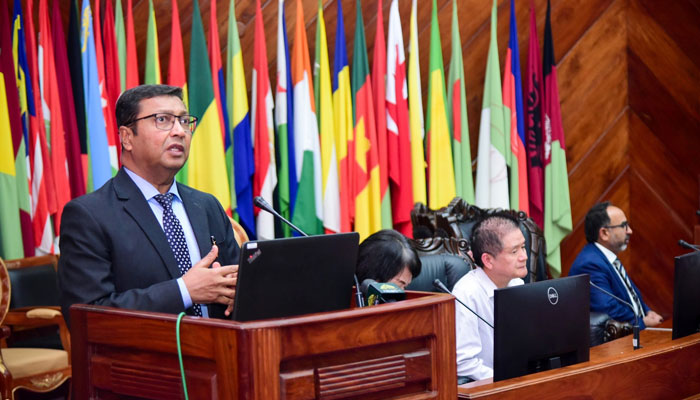Sino-COMSTECH collaboration strengthens scientific and health partnerships
Islamabad:OIC-COMSTECH, the Ministerial Standing Committee on Scientific and Technological Cooperation under the Organization of Islamic Cooperation (OIC), continues to strengthen its collaborations with China in the fields of science, technology, and health.
The initiative underscores international scientific cooperation and its growing strategic partnership with China. During a ceremony at COMSTECH Secretariat Islamabad, Prof. Dr. Muhammad Iqbal Choudhary, Coordinator General OIC-COMSTECH, highlighted the various collaborative initiatives between COMSTECH and China in the fields of science, technology, and health.
He also appreciated the contributions of Prof. Dr. Xinmin Liu, a distinguished Chinese scientist, for his outstanding role in fostering Sino-Pakistan scientific collaboration over the past 25 years, Dr. Liu has played a key role in training Pakistani researchers in advanced scientific fields, establishing the Pakistan Centre for Traditional Medicine. In recognition of his efforts, he has been awarded the Tamgha-e-Quaid-e-Azam, one of Pakistan’s highest civilian honours for foreign nationals.
Prof. Dr. M.Iqbal Choudhary stated that OIC-COMSTECH, plays a key role in implementing OIC resolutions on science, technology, health, agriculture, higher education, and climate change. Pakistan has also been instrumental in introducing China as a special representative to the OIC, fostering global research partnerships.
The China-Pakistan Strategic Collaboration in Science and Technology has expanded across multiple sectors, including space research, traditional medicine, and high-tech innovation. The Seeds in Space Programme is a China-Pakistan initiative studying how space conditions affect medicinal plants. Additionally, under the Belt and Road Initiative (BRI), China has offered 100 research fellowships to Pakistani scientists in fields such as precision agriculture, virology, and infectious diseases. In the field of Traditional Chinese Medicine (TCM) and herbal medicine, China is conducting clinical trials of TCM products in Pakistan, paving the way for the registration of herbal medicines for local use. Chinese pharmaceutical companies are also exploring opportunities to establish operations in Pakistan, while 10 Pakistani doctors will receive annual training in TCM practices at top Chinese universities.
The Department of Health, Government of Sindh, under the leadership of the provincial minister, Dr Azra, launched major TCM programs for the benefit of patients. High-tech and digital innovation remain key areas of collaboration, with joint projects in artificial intelligence (AI), cybersecurity, and digital transformation, particularly in partnership with Huawei. Collaborative research in biotechnology and nutritional medicine is also underway to develop nutritional supplements from medicinal plants for chronic disease management. Looking ahead, China and COMSTECH aim to further strengthen their scientific partnership in key areas such as space medicine research, higher education, and economic growth through innovation.
Chinese universities, including Xinjiang Medical University, Ningbo University, and Hunan University of Chinese Medicine, are actively training Pakistani researchers at the International Centre for Chemical and Biological Sciences, Hamdard University, and the University of Lahore, reinforcing educational ties between the two nations. These initiatives are expected to enhance Pakistan’s research capabilities, attract investment, and drive technological progress.
-
 Prince William Warned His Future Reign Will Be Affected By Andrew Scandal
Prince William Warned His Future Reign Will Be Affected By Andrew Scandal -
 Amy Madigan Reflects On Husband Ed Harris' Support After Oscar Nomination
Amy Madigan Reflects On Husband Ed Harris' Support After Oscar Nomination -
 Is Studying Medicine Useless? Elon Musk’s Claim That AI Will Outperform Surgeons Sparks Debate
Is Studying Medicine Useless? Elon Musk’s Claim That AI Will Outperform Surgeons Sparks Debate -
 Margot Robbie Gushes Over 'Wuthering Heights' Director: 'I'd Follow Her Anywhere'
Margot Robbie Gushes Over 'Wuthering Heights' Director: 'I'd Follow Her Anywhere' -
 'The Muppet Show' Star Miss Piggy Gives Fans THIS Advice
'The Muppet Show' Star Miss Piggy Gives Fans THIS Advice -
 Sarah Ferguson Concerned For Princess Eugenie, Beatrice Amid Epstein Scandal
Sarah Ferguson Concerned For Princess Eugenie, Beatrice Amid Epstein Scandal -
 Uber Enters Seven New European Markets In Major Food-delivery Expansion
Uber Enters Seven New European Markets In Major Food-delivery Expansion -
 Hollywood Fights Back Against Super-realistic AI Video Tool
Hollywood Fights Back Against Super-realistic AI Video Tool -
 Pentagon Threatens To Cut Ties With Anthropic Over AI Safeguards Dispute
Pentagon Threatens To Cut Ties With Anthropic Over AI Safeguards Dispute -
 Meghan Markle's Father Shares Fresh Health Update
Meghan Markle's Father Shares Fresh Health Update -
 Samsung Galaxy Unpacked 2026: What To Expect On February 25
Samsung Galaxy Unpacked 2026: What To Expect On February 25 -
 Travis Kelce Takes Hilarious Jab At Taylor Swift In Valentine’s Day Post
Travis Kelce Takes Hilarious Jab At Taylor Swift In Valentine’s Day Post -
 NASA Confirms Arrival Of SpaceX Crew-12 Astronauts At The International Space Station
NASA Confirms Arrival Of SpaceX Crew-12 Astronauts At The International Space Station -
 Can AI Bully Humans? Bot Publicly Criticises Engineer After Code Rejection
Can AI Bully Humans? Bot Publicly Criticises Engineer After Code Rejection -
 Search For Savannah Guthrie’s Abducted Mom Enters Unthinkable Phase
Search For Savannah Guthrie’s Abducted Mom Enters Unthinkable Phase -
 Imagine Dragons Star, Dan Reynolds Recalls 'frustrating' Diagnosis
Imagine Dragons Star, Dan Reynolds Recalls 'frustrating' Diagnosis




